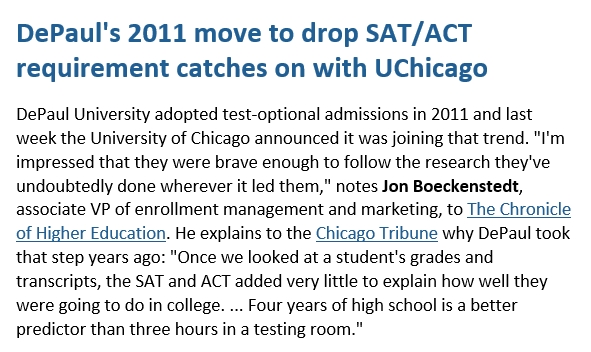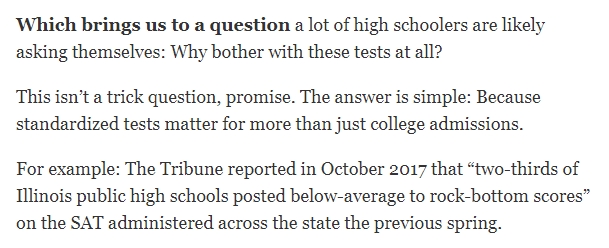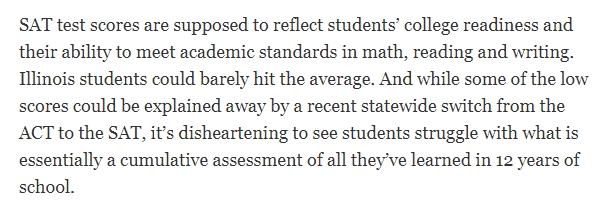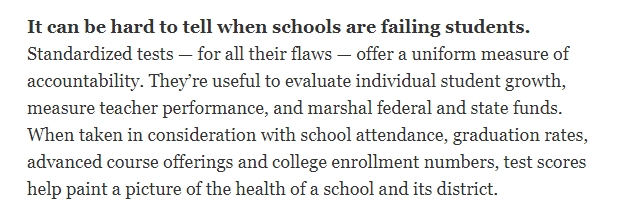We in higher education enjoy an enviable competitive environment, probably unlike any you’ll find in other industries. It’s not like when Komatsu summed up its entire strategic plan with two words: Encircle Caterpillar .
We in higher education actually like when our rivals and competitors do well, and do good things. This is, of course, provided we can pay our mortgages and keep food on the table at home. We have bills like everyone else, and there is a limit to our largess.
Thus, last week, when The University of Chicago made a stunning announcement that they would go test-optional in admissions, we felt a lot of things: Surprise, of course, but also confirmation, and yes, even vindication of our own decision to eliminate testing requirements in admissions in 2011. (The students admitted without tests are doing quite well, by the way, just as the research suggested they would). Our own office of Public Relations and Communications, in an internal newsletter, sent this out, getting in on the fun while congratulating our neighbors in Hyde Park:

Of course, many colleges can go test-optional. Of equal importance was Chicago’s announcement to increase financial aid substantially. The combination of changes to admissions and increases in financial aid could end up being expensive. But then, again, they’re one of the few places in the country that could afford to do so.
All we can say is, “Well done.”
I presume, but do not know for sure, that Chicago did the same type of analysis that every test-optional college has done, demonstrating that–once you look at everything else in the application file–standardized tests add almost nothing to your ability to make good admissions decisions. (BTW, almost every college that has gone test-optional has to get the policy through some sort of faculty committee, filled with Ph.D.s who know research and statistics. They can be a tough crowd when they want to be. Even when they don’t want to be.)
And I suspect they also know that there are a lot of very bright, inquisitive, angular, creative, and witty people in the world who don’t test well: False negatives, we’d call them, if we could ever figure out exactly what we were looking for in the first place. Of course, they certainly must know that the college academic performance of low-income students, women, people of color, and first-generation students–the very ones America should be educating in greater numbers–is under-predicted by tests. It’s almost like white guys set up systems to perpetuate the advantage they have in the world. Go figure.
To be frank, Chicago probably doesn’t care what I think, but probably also has a lot more to lose than DePaul did. It’s still worth repeating: Their bravery is admirable.
There are rumors–not verified, but sufficiently substantiated–that two or three other big names are ready to move forward with similar announcements. You would understand if they have second thoughts, however, when you see stuff like this, from when we made our announcement (this was originally in the Chicago Sun-Times, but I cannot find it there now):

So I guess I shouldn’t have been surprised this morning when this popped up my feed: This headline and the article that goes with it are presumably written by educated members of the editorial board at the Chicago Tribune.

It’s among the most ridiculous things I’ve ever read on the subject, and believe me, that’s saying something. Let me address parts of it piece-by-piece. First, the headline. It’s wrong. ACT and SAT are, in fact, just for colleges. So you already lost me.
Next up:

That’s actually a good question, Tribune editorial writers. Why take them? If you can find a college on this list that looks good to you, you don’t need to. At all.
What’s more troubling is the lack of understanding about how norm-referenced tests work: They are designed to be normally distributed. And across the population, they are: No more than 10% can get a score in the top 10%. The middle will always be in the middle, with only minute differences from year to year. This is very different than a biology class, for instance, where, if everyone studies really hard, it’s possible everyone in the class could get an A grade.
But those norm-referenced tests don’t treat every person equally, of course. If you have large numbers of students of color from low-income families like the public schools in Chicago do, test scores are going to be lower. This is due to many reasons I and others have written about before, but it usually boils down to one word: Money.
They continue, with this paragraph that might have broken the stupid-meter:

First, two private companies made up the “college readiness” stuff. No one appointed them. No one voted for them. It’s as if we entrusted Disney Land to benchmark happiness (the research suggests we are short on happiness, and the answer to our happiness deficit is more Disney Land). The more problems College Board and ACT can identify with their self-created “benchmarks” the more tests they sell. Did a light bulb just go off in your head, Tribune Editorial Board? I hope so.
Again, Illinois students are about average because every state will be about average, adjusted for the population of testers. Wealthier states with higher percentages of White and Asian students will score higher. Poorer states with higher percentages of Black and Hispanic students will score lower.
Then, the sentence about the switch from ACT to SAT seems like it was thrown in by the intern as she brought Starbucks into the editorial room while they were trying to come up with some more reasons to explain test performance. It makes no sense. Unfortunately for my comic routine, they didn’t try to explain how the switch might account for anything. And finally, these tests are not a cumulative assessment of all students have learned in 12 years of school. No. Nope. Nuh-uh.
Depending on whom you talk to, tests measure income, ethnicity, speed processing ability, preparation, time spent prepping for the specific test, intellect, MBTI type, social capital, and learning, in some combination.
Here we go: Perhaps the most wrong sentence of the article.

Is there a word other than “wrong” for something that is the complete opposite of right? Because that’s the word I need right now. Tests are designed to measure a single student. Not schools, not teachers, not school districts. They were never intended to show legislatures how to allocate money. They were never intended to indicate which colleges had the smartest students. They may show a picture of health, but you could figure that out by looking at where the most poor kids go to school. Hint: Those are the schools that need the most money, State Legislators.
And, the wrap up:

Pretty much everyone who has ever worked in admissions is saying, “WTF?” right now.
If you’re planning to take your institution test-optional, get ready for the onslaught of stupid. It’s inevitable. But don’t let it keep you from doing what you know is the right thing. There is lots to like about test-optional, only if it causes you to stop thinking of students as two-dimensional.
Oh, and if you’re starting to write an editorial criticizing a college for going test-optional? 312-362-7143 rings on my desk. My email is jon.boeckenstedt@depaul.edu If you don’t want to talk to me, I can recommend dozens of others to help you get your facts straight.
Jon, I knew I was going to love reading this just from your title!
LikeLiked by 2 people
Thank goodness for your brilliant mind and equally bold and perfect writing. Shame on the Chicago Tribune for not doing better research.
LikeLiked by 2 people
If standardized tests are so bad, then why make it optional? And why leave that option up to the
applicant?! You don’t allow a student to pick and choose other parts of their application. You could require the test and have your admissions folks minimize its importance. Or you just go full test-blind and not consider it at all. It seems to me that test-optional schools are being disingenuous. You are trying to have your cake and eat it too.
LikeLike
I don’t argue with anonymous trolls on the Internet, but if you care to email me with your real name, I’d be happy to reply to you. I’ve addressed both of these issues in depth in the past.
LikeLiked by 1 person
Nope. If so many of the decision-makers remain challenged in their beliefs these tests actually measure something worthwhile, why not give good test-takers the chance to impress them?
LikeLike
Nope. Candidates have all sorts of choices when completing their applications. Moreover, if some gatekeepers are so mentally challenged as to believe these tests actually measure something important, give the good test-takers the opportunity to exploit their ignorance.
LikeLike
Jon, Love it, love it, and the TrIb is so deserving of your scalpel treatment.
So, I’ll pick one tiny nit from your otherwise-exquisite take-down: “Depending on whom you talk to, tests measure income, ethnicity, speed processing ability, preparation, time spent prepping for the specific test, intellect, MBTI type, social capital, and learning, in some combination.” Saul Geiser got a higher correlation with parental education than family income in the UCB and UC admissions pools.
Isn’t sad that third parties put out dumber stuff than even the test developers? That takes some effort.
Thanks,
Jay
From: Jon Boeckenstedt’s Admissions Weblog Reply-To: Jon Boeckenstedt’s Admissions Weblog Date: Wednesday, June 20, 2018 at 11:27 AM To: Subject: [New post] The Biggest Barrier to Test Optional Admissions: Mass Stupidity
Jon Boeckenstedt posted: “We in higher education enjoy an enviable competitive environment, probably unlike any you’ll find in other industries. It’s not like when Komatsu summed up its entire strategic plan with two words: Encircle Caterpillar . We in higher education actually “
LikeLike
Brilliant! Thank you, Joe, for hitting this issue head on. You continue to inspire!
LikeLiked by 1 person
Well said….your writing is beautifully refreshing and holds people accountable for their words. Thank you!
LikeLiked by 1 person
Jon.
I have to disagree with your argument, as I frame it, that the “colleges that support and choose Test Optional Admissions dumb-down higher institution of learning” isn’t true at all. The colleges that choose the Test Optional Admissions policy are doing both students and taxpayers (parents, namely) a very big favor: saving students lots of money and time wasted in test prep and parents money and anguish trying to get their kids into a highly selective institution of their own choice.
The SAT and ACT tests sole purpose are only to measure Scholastic and Aptitude capability of every student respectively. They are not an accurate measure of predicting a students success in college as you mentioned briefly in your blog nor were they ever meant to be. Test can’t measure the much highly needed critical thinking skills or soft skills that all students need (communication face to face i.e.) in order to succeed in the 21st Century.
Taking tests are a utter waste of time if they can’t measure what the world needs most: highly educated, skilled competent workers and leaders who are needed to run our schools, businesses and political system which is in REAL NEED of a highly educated competent leader more so than the current bozo the clown we have today.
LikeLike
Hi Marc. The article I linked to suggesting test optional dumbed down admissions was one I was disagreeing with. It came out after my institution went test optional in 2011.
LikeLiked by 1 person